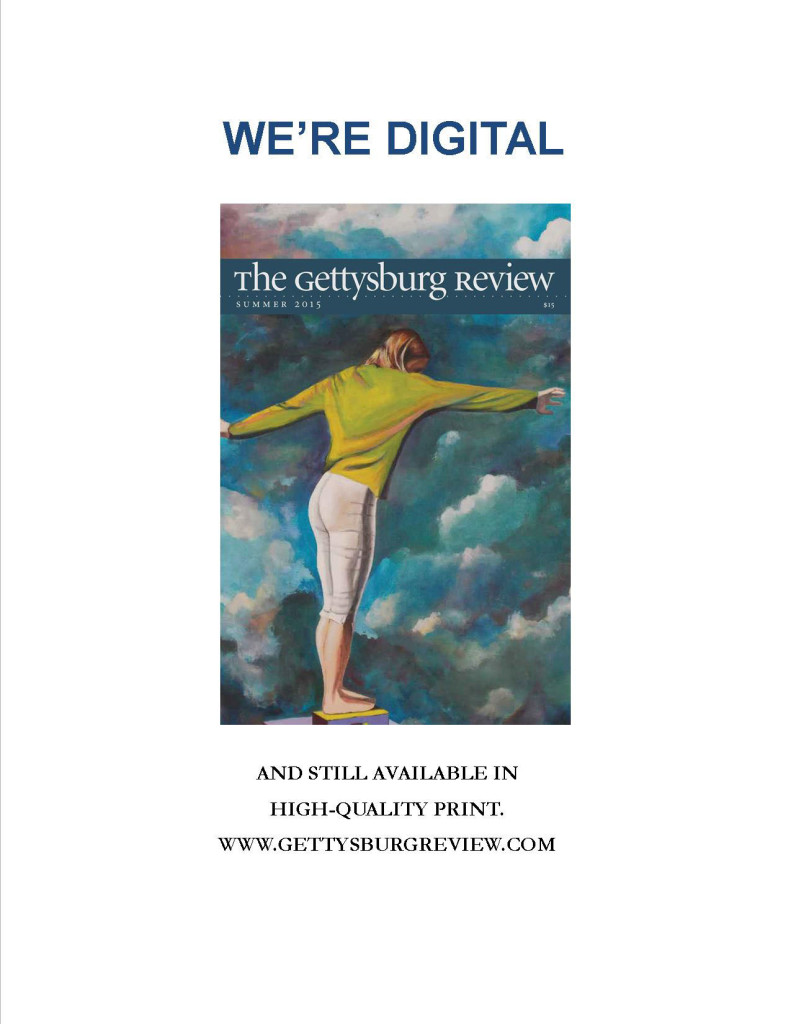The Gettysburg Review
SR Pod/Vod Series: Poet Patricia Clark
Each Tuesday we feature audio or video of an SR Contributor reading their work. Today we’re proud to feature a podcast by Patricia Clark.
 Patricia Clark is Poet-in-Residence and Professor in the Department of Writing at Grand Valley State University. Author of three volumes of poetry, Patricia’s newest book is She Walks into the Sea; she has also published a chapbook, Given the Trees. Patricia’s work has been featured on Poetry Daily and Verse Daily. She has won Mississippi Reviews Poetry Prize, and been honored as the 2nd prize winner in the 2005 Pablo Neruda/Nimrod International Journal Poetry competition. Her poems have appeared in The Atlantic Monthly, Poetry, Slate, Stand, The Gettysburg Review, and many other literary magazines.
Patricia Clark is Poet-in-Residence and Professor in the Department of Writing at Grand Valley State University. Author of three volumes of poetry, Patricia’s newest book is She Walks into the Sea; she has also published a chapbook, Given the Trees. Patricia’s work has been featured on Poetry Daily and Verse Daily. She has won Mississippi Reviews Poetry Prize, and been honored as the 2nd prize winner in the 2005 Pablo Neruda/Nimrod International Journal Poetry competition. Her poems have appeared in The Atlantic Monthly, Poetry, Slate, Stand, The Gettysburg Review, and many other literary magazines.
You can listen to the podcast on our iTunes Channel.
You can read along with the work in Superstition Review.
Guest Blog Post, Mark Lewandowski: Paper vs. Plastic; or a Tale of Two Essays
 For many years I resisted submitting my work to online journals. I suppose I was afraid they didn’t have the reputation of paper journals, and that my university wouldn’t consider them legitimate venues for a creative writing professor’s work. Or maybe there was something off-putting about reading something on the same plastic device I composed it on. Reading my work in published form already makes me squirm; too often I want to declunkify numerous sentences. At least if the story or essay is already in a book or journal there’s not much you can do about it. It’s there with all its blemishes permanently intact.
For many years I resisted submitting my work to online journals. I suppose I was afraid they didn’t have the reputation of paper journals, and that my university wouldn’t consider them legitimate venues for a creative writing professor’s work. Or maybe there was something off-putting about reading something on the same plastic device I composed it on. Reading my work in published form already makes me squirm; too often I want to declunkify numerous sentences. At least if the story or essay is already in a book or journal there’s not much you can do about it. It’s there with all its blemishes permanently intact.
Words on a computer screen, on the other hand, seem so ephemeral. All writers want their work to survive the ages. A book might become thick with dust, but you can still store, and then later find it on a shelf. With one click on a computer you can replace your work in an on-line journal with Miley Cyrus’s latest twerking pic.
But two years ago my attitude towards online journals changed completely. At AWP one year, novelist Leslie Pietrzyk asked me to submit something to Redux, a new on-line journal devoted to “reprinting” stories, poems and essays that had once appeared in journals now “languishing on dusty library shelves.” No one had ever solicited work from me before. I was thrilled, even it was “only” for an on-line journal. Some months later I sent Leslie “Tourist Season at Auschwitz,” which originally appeared in The Gettysburg Review. (I found out later that the issue containing my essay sold out.) It appeared in Redux a month or two later. The journal is a simple affair. Each weekly issue contains just one story, essay or poem, followed by an account of its composition. Leslie uses a simple WordPress blogging program with few bells and whistles. This being a labor of love, Redux can’t pay its contributors.
At about the same time Traveler’s Tales published A Small Key Opens Big Doors, one of four anthologies celebrating the 50th anniversary of the Peace Corps. It contains my essay “Caroline,” which first appeared some years ago in Cimarron Review. (Like “Tourist Season at Auschwitz,” “Caroline” sprang from the same frantic pile of material I wrote after my three visits to Auschwitz in the early 90’s.) It’s a beautiful volume—thick, creamy paper, an eye catching, dark red cover. It looks like an appropriate Christmas gift, or something you’d give to someone going into the Peace Corps. My remuneration? Contributor’s copies.
I pushed both the anthology and the online journal, using all the social networking I could stomach: My blog, Twitter, Facebook, etc. Because the essays are drawn from a common material I was able to broadcast both on any number of Facebook pages, including ones devoted to Peace Corps Poland, Polish American Writers, and stories of World War II. I included links to the journal, and links to the appropriate Amazon page.
I soon realized what I’m sure is obvious to others: more people read “Tourist Season at Auschwitz” than “Caroline.” You can track hits on Redux, same as you can track sales on Amazon. People responded to “Tourist Season” on all the Facebook pages. Most of them even said nice things about it. It got around. People shared it on other pages. Some still do, in fact. “Caroline?” Not so much. Maybe it’s a weaker essay. I don’t know. More likely, the anthology is simply harder to share. Asking someone one to click on a link and read is far easier than asking someone to click on a link, pony up $20, and then wait a week for the book to show up.
And Amazon makes it easy with books. What about those beautiful literary journals? Numerous times on my travels around the world people have asked me if they could find stuff I published. “Sure,” I might say, “just send a check to this university. Make sure it’s not during the summer. No one’s going to be there. Oh, and I really don’t know the volume number containing my story, so just tell them it came out in 1998. But, given all the delays journals are prone to, the appropriate issue, even though it appeared in 1998, is really, officially, a 1996 issue. You could just give them my name, but interns come and go; whoever gets your check might not recognize my name. Just go by the cover art. Tell them you want the issue with the dog on the cover. I’m pretty sure there’s only one dog cover.”
I don’t have to do that as often anymore. Now, I can just say, “Superstition Review. My name is in the index.” Not even that, actually. If they have a smart phone, I can find my work for them immediately.
The other day I was talking to my friend and colleague, Matthew Brennan. He’s a very well published poet. I asked him if he ever submitted to online journals. He shrugged and said, “Nah, I like how the journals look on my book shelf.”
And they do. I can’t deny it. I like the feel of them. I even like how some of the issues containing my work have begun to yellow and grow brittle. It was a big deal to me when my first story made it into print. It took a lot of years for it to happen. When I see that issue of Red Cedar Review on my shelf it’s like looking at the trophy I won for little league baseball. When the journal first came out I didn’t give much thought to readers. First and foremost I wanted to see my name in print.
Now I think more about an audience. I have enough paper journals on my shelf; I want to be read. For good or bad it’s simply easier to reach an audience with an online journal than with a paper one. Besides, if someone likes my work, say in Superstition Review, they can click on the appropriate link, pony up $20, and in a week my book will be in their mail box. Sure, journals containing your work look nice when you get them. You know what else looks good? Royalty checks.
SR Pod/Vod Series: Poet Deborah Bogen
Each Tuesday we feature audio or video of an SR Contributor reading their work. Today we’re proud to feature a podcast by Deborah Bogen.
 Deborah Bogen is the author of three prize-winning works: Living by the Children’s Cemetery (2000 Byline Press), Landscape With Silos (2006 Texas Review Press) and the forthcoming Let Me Open You a Swan (April 2010, Elixir Press). Her poetry and reviews appear widely in journals like Crazyhorse, The Iowa Review, New Letters, The Georgia Review, Shenandoah, The Gettysburg Review and others. For the past 10 years she’s conducted free writing workshops in her Pittsburgh living room.
Deborah Bogen is the author of three prize-winning works: Living by the Children’s Cemetery (2000 Byline Press), Landscape With Silos (2006 Texas Review Press) and the forthcoming Let Me Open You a Swan (April 2010, Elixir Press). Her poetry and reviews appear widely in journals like Crazyhorse, The Iowa Review, New Letters, The Georgia Review, Shenandoah, The Gettysburg Review and others. For the past 10 years she’s conducted free writing workshops in her Pittsburgh living room.
You can read along with her poems in Issue 4 of Superstition Review.
To subscribe to our iTunes U channel, go to http://itunes.apple.com/us/itunes-u/superstition-review-online/id552593273
